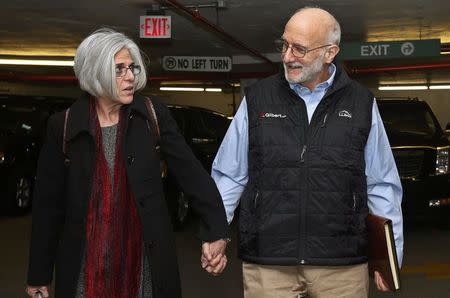 |
| Alan and Judy Gross walk through a parking garage after arriving for a news conference at a law firm in Washington December 17, 2014. REUTERS/Kevin Lamarque |
By Daniel Trotta and Steve Holland
HAVANA/WASHINGTON (Reuters) - The United States and Cuba agreed on Wednesday to restore diplomatic ties that Washington severed more than 50 years ago, and President Barack Obama called for an end to the long economic embargo against its old Cold War enemy.
After 18 months of secret talks, Obama and Cuban President Raul Castro agreed in a phone call on Tuesday on a breakthrough prisoner exchange, the opening of embassies in each other's countries, and an easing of some restrictions on commerce.
The two leaders made the announcement in simultaneous televised speeches. The Vatican and Canada facilitated the deal.
Obama's call for an end to the economic embargo drew resistance from Republicans who will control both houses of Congress from January and who oppose normal relations with the Communist-run island.
Obama said he was ending what he called a rigid and outdated policy of isolating Cuba that had failed to achieve change on the island.
View gallery
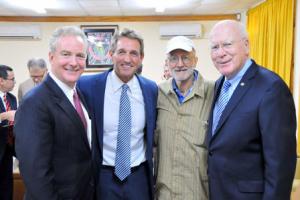
American aid worker Alan Gross (2nd R) poses after his release with L-R, U.S. Rep. Chris Van Hollen …
His administration's policy shift includes an opening to more commerce in some areas, allowing use of U.S. credit and debit cards, increasing the amount of money that can be sent to Cubans and allowing export of telecommunications devices and services.
RESTRICTIONS REMAIN
Travel restrictions that make it hard for most Americans to visit will be eased, but the door will not yet be open for broad U.S. tourism on the Caribbean island.
Obama's announcement also will not end the U.S. trade embargo that has been in force for more than 50 years. That is codified in legislation and needs congressional approval. Obama said he would seek that approval but likely faces a struggle.
But sanctions experts said Obama had leeway to use executive his powers to ease the embargo even in the face of congressional objections.
View gallery
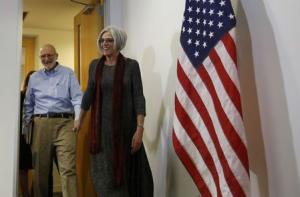
Alan and Judy Gross arrive for a news conference in Washington December 17, 2014, after Cuba release …
"There is a lot of breadth to authorize things more broadly than they’ve been authorized, provided that the broad (legislative) contours are adhered to," said Peter Kucik, a former Treasury Department official who worked on Cuban sanctions.
Obama said the opening was made possible by Havana's release of American Alan Gross, 65, who had been imprisoned in Cuba for five years. Gross' case had been a major obstacle to improving relations.
Cuba also released an intelligence agent who spied for the United States and was held for nearly 20 years, and the United States in return freed three Cuban intelligence agents held in the United States.
Cuba and the United States have been ideological foes since soon after the 1959 revolution that brought President Raul Castro's older brother, Fidel Castro, to power. Washington broke diplomatic relations with Havana in 1961 as Cuba steered a leftist course that turned it into a close ally of the former Soviet Union on the island, which lies just 90 miles (140 km) south of Florida.
The hostilities were punctuated by crises over spies, refugees and the Cuban missile crisis of October 1962 that brought the world to the brink of nuclear war. After the demise of the Soviet Union and the end of the Cold War, Washington was increasingly alone in its efforts to squeeze Cuba. Raul Castro, who took over from Fidel Castro when his brother retired in 2008, has maintained a one-party political system.
View gallery
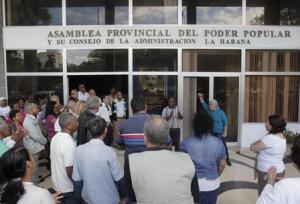
People gather outside a building of the Provincial Assembly of the People's Power for news updat …
CRITICS CHALLENGE OBAMA
Obama said Cuba still needed to enact economic reforms and uphold human rights among other changes but that it was time for a new approach.
Americans are largely open to establishing diplomatic relations with Cuba, according to a Reuters/Ipsos poll of more than 31,000 adults conducted between July and October. About one-fifth of those surveyed said they opposed such a move, while 43 percent said the United States should restore relations with Cuba and around 37 percent said they were unsure.
Critics said Cuba should not be rewarded, having yet to change, and the path to completely normal ties is strewn with obstacles, in particular lifting the embargo that the White House said Obama would like to see dismantled by the time he leaves office in 2017.
Although a growing number of U.S. lawmakers favor more normal ties, those lawmakers are still mostly Democrats, and after big midterm election gains in November, Republicans will control both houses of Congress in the new year.
View gallery
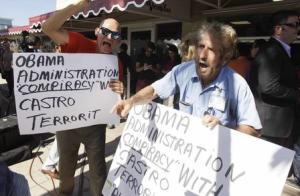
Anti-Castro activists Osvaldo Hernandez (L), and Miguel Saavedra protest in Little Havana in Miami, …
Senator Marco Rubio, a Cuban-American Republican, said he was committed to doing all he could to "unravel" the plan. Senators John McCain and Lindsey Graham, both set to hold senior foreign policy positions, said the policy shift reflected "America and the values it stands for in retreat and decline."
Former Secretary of State and potential 2016 Democratic presidential contender Hillary Clinton backed Obama's move, saying: "Our decades-long policy of isolation has only strengthened the Castro regime's grip on power."
Whatever the criticism at home, Obama's move was made with the political liberty of a president who, midway through his second term, no longer has to face the electorate.
CUBAN-AMERICANS SPLIT
News of the changes rippled fast through the 1.5 million-strong Cuban-American community in the United States. It was hailed by some who are eager to see closer ties with the island and condemned by others.
View gallery
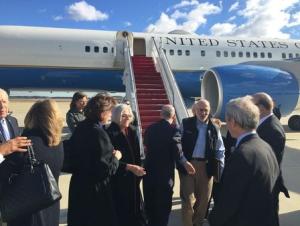
American aid worker Alan Gross (3rd R) disembarks with his wife Judy (4th L) from a U.S. government …
Older Cubans who left the island soon after the revolution have remained opposed to ties with either Castro brother in power. Younger Cubans, who left more recently or were born in the United States, have shown more interest in warmer relations.
"It's amazing," said Hugo Cancio, who arrived in Miami in the 1980 Mariel boatlift and runs a magazine with offices in Miami and Havana. "This is a new beginning, a dream come true for the 11.2 million Cubans in Cuba, and I think it will provoke a change of mentality here too in this community."
In Havana, stunned Cubans celebrated the news, although some were skeptical the long years of animosity really would end. In one student demonstration on a busy Havana street corner, about 100 people shut off traffic while motorists honked their horns. Neighbors peered out from their balconies, joining in the cheers.
"I have waited for this day since I can remember," said taxi driver Jorge Reymond, wiping away tears.
Obama's move was also praised by Latin American leaders, who have urged Washington for years to drop its economic embargo against Havana.
View gallery
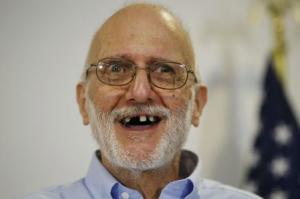
Alan Gross smiles as he talks about his release from Cuban prison during a news conference shortly a …
GROSS CASE
Obama said the Gross case had stalled his ambitions to try to reset relations with Havana, calling it a "major obstacle." Pope Francis, the first Latin American pontiff, played an active role in pressing for his release from Cuba, where a sizable part of the population is Roman Catholic.
Cuba arrested Gross on Dec. 3, 2009, and sentenced him to 15 years in prison for importing banned technology and trying to establish clandestine Internet service for Cuban Jews. Gross had been working as a subcontractor for the U.S. Agency for International Development.
Gross' lawyer and family have described him as mentally vanquished, gaunt, hobbling and missing five teeth. Speaking to reporters after arriving in the United States, Gross thanked Obama for all he had done to secure his release and said he did not blame the Cuban people for his ordeal.
The three Cuban intelligence agents, jailed since 1998, are Gerardo Hernandez, 49, Antonio Guerrero, 56, and Ramon Labañino, 51. Two others had been released before on completing their sentences - Rene Gonzalez, 58, and Fernando Gonzalez, 51. The three arrived in Cuba on Wednesday, Castro said.
(Additional reporting by Matt Spetalnick, Patricia Zengerle, Roberta Rampton, Richard Cowan, Anna Yukhananov and Alistair Bell in Washington, and Anthony Boadle in Brasilia; Writing by Frances Kerry; Editing by Howard Goller, Peter Cooney and Lisa Shumaker)